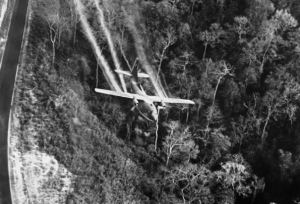Vietnam had been an independent nation for over 800 years when the French invaded in the late 1800s, believing that it would allow them to gain entry to China. France controlled Vietnam until World War 2, when the Japanese invaded; however, at the end of the war, the allies allowed the French to regain control.
The Vietnamese people fought against French occupation for nearly 10 years; the French finally surrendering after vicious fighting on the eve of the International Conference in Geneva in 1954. The conference failed to provide a lasting solution for Vietnam; instead the country was divided in half, with elections to be held in two years’ time. In the South the elections never took place, as it was presumed by the Americans that Ho Chi Minh’s Communist party would win, and thus the fight against communism would be lost. Meanwhile Ho Chi Minh gathered support in the North, also drawing together opposition forces in the south.
In 1964 Senators in the US voted for a permanent US army deployment to support the puppet government in South Vietnam. Thus began the war in which an estimated 57,600 American soldiers were killed alongside over 3 million Vietnamese. In an attempt at deforestation the American forces sprayed the Vietnamese countryside with 80 million litres of toxic chemicals, (mostly Agent Orange) which contained nearly 400 kilograms of dioxin, the most lethal substance known to man. As well as committing other atrocities, towards the end of the war the American forces began carpet bombing many of Vietnam’s cities including Hanoi and Hai Phong, dropping a total of 8 million tons of bombs.
The Americans were forced to withdraw in 1973, and the country was unified in 1976. The Socialist Republic of Vietnam was officially declared, and the Vietnamese people began to rebuild their country. However, many western countries followed America’s lead by imposing a trade embargo upon Vietnam, which even prevented them importing medicines and medical supplies. This was eventually lifted in 1994.
The legacy of war still remains in Vietnam, with a third generation of people now being born suffering from the lasting impact of the American defoliation program; there are three million victims living with the effects of the toxic chemicals. A market economy was established in the 1980’s and the economy is slowly growing, but there are still many people in need of medical aid.


















